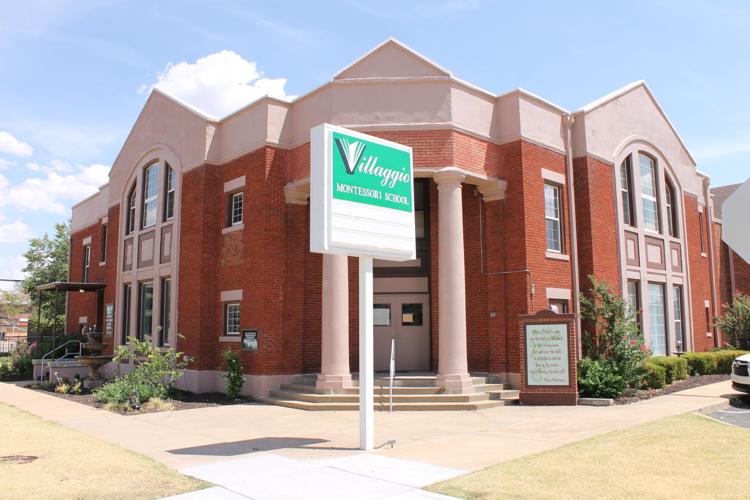The lights are set to come back on next month at the Montessori school at the corner of Jefferson and Maple.
Longtime Enid educators Jeff and Darla Brooks have spent the last few months putting the finishing touches on their latest and biggest schooling venture — restoring and reopening the historic downtown Enid building that for decades housed the alternative education method.
Next month, the Brookses’ new Villaggio Montessori School will offer classes for five child age groups: the “Nido” (Italian for “nest”) group, for children from birth to 18 months old; toddlers, 18-36 months; early primary, 2-5 years old; primary, 3-7; and elementary, for first- through fifth-graders.
The school, at 419 W. Maple, will be open year-round, with school-year sessions and summertime child care. Annual holiday breaks will include learning experiences such as local community field trips and visits to the Arbors, an assisted living center also owned by the Brookses.
School starts tentatively Aug. 22, but the facility still is taking new students, Darla said. Interested families can contact her at (580) 541-8471 or by email at brooksd1978@gmail.com for an application.
A new beginning
The Brookses, who have lived and taught in Enid for three decades, also own and operate three child care centers for infants through elementary-aged children — Applewood Early Learning, located in YWCA Enid; Turn the Page preschool, at 1524 E. Broadway; and Summerhill Children’s House, at 4619 W. Randolph.
“You know how in your career when you’ve been doing it for a long time? To avoid burnout you have to do something that lights you up, and switch it up and do something new? That’s what this school is for Jeff and I — something new,” Darla said.
Villaggio would be their first site to house elementary-age students year-round instead of only in after-school programs.
After buying the school at the end of 2021, the Brookses both became Montessori-certified — so they also could teach at the new site — while also hiring a Montessori teacher from Colorado.
Affiliated with the American Montessori Society, the student-led education program gives children more freedom than in a typical school setting to physically move around the classroom and to complete weekly assignments with teacher supervision.
Cimarron Montessori School, which also had toddler, primary and elementary programs, closed its doors at the location for good in spring 2021, after operating for nearly half a century in Enid.
Darla said once news broke earlier this spring that the historic building would be reopening, former Cimarron families immediately reached out about returning to the new school.
Unloading ‘all the resources’
The Brookses themselves put thousands into renovating the run-down building, which had been too expensive for Cimarron to maintain when it was open.
Five classrooms and a gymnasium are on the first floor. The second floor houses three more classrooms, as well as a children’s work room and a library/reading room.
With several of their 11 children helping with the handiwork, the couple repainted, rebuilt and refurbished every nook and cranny.
“Everything got touched. There’s not one surface that didn’t get touched,” Darla said.
Custom cabinetry they had built was installed in the early elementary room, while green turf was added to the outside play area. The former gym still is being converted into what the Brookses call the “exploratorium,” featuring a mock café called Café Villaggio, a storefront and a whiteboard wall covered in magnetized pieces to create Rube Goldberg-style contraptions for rolling balls.
“We unloaded all the resources we have, and we’re just giving it our all,” Jeff said.
Looking for the best options
Enid parents Dawnella and Arch Haymaker were the first family to tour the nearly finished school on Monday with the Brookses. Their 2-year-old son, Mack, played with and tested out all the new toys and learning materials in each room during the hour-long visit.
Mack had been at daycare for the last few months, but Dawnella said she thought the Montessori method would be a natural fit for smaller children, who she said naturally want to explore and learn but still need adult guidance.
“We’re just looking for the best option for him,” Dawnella said.
“I think if we’re gonna send him somewhere, it needs to be a place he can learn, not just survive,” her husband added.
In the first floor’s early elementary room, Mack had been playing with a toy farm, which included a red barn and a dozen farm animals like cows, horses and pigs.
Jeff said the barn set and animals were specifically intended for students to learn about parts of speech, step by step — the cow is a noun, its black color is an adjective and “on the grass” is a prepositional phrase.
Following Maria Montessori’s century-old teaching method, learning begins with these concrete thoughts, then moves to abstract, Jeff said.
“Everything they learn real young is gonna build through their education,” he said. “And it’s not gonna be from a MacMillan textbook — it’s gonna be through a real-life farm. … It starts with concrete in the beginning, because that’s what we all need.”
Article by: Alexander Ewald, Enid News & Eagle 7.27.22

